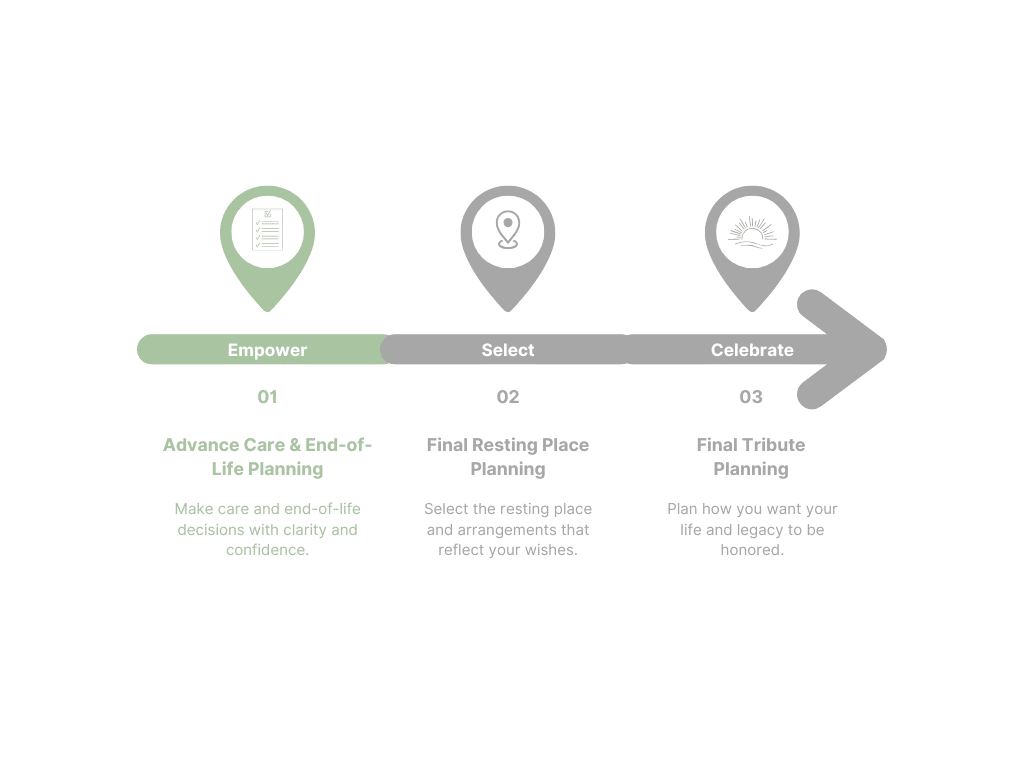Plan now so others are not guessing later.
The Advance Care & End-of-Life Planning Information Hub
Setting your care wishes in advance is one of the most important steps you can take. This hub walks you through making medical decisions, choosing a healthcare proxy, and putting the right documents in place so your voice is heard when it matters most.

Key Things To Know
Before you begin, here are important things to know about planning your care and end-of-life wishes.
- Advance care plans are for everyone: Planning is not just for the elderly or sick.
- Start before there is a crisis: Early decisions give you more choices and less pressure.
- Naming a healthcare proxy matters: Someone you trust should be ready to speak for you if needed.
- Clear documents prevent confusion: Written plans guide your loved ones and medical teams.
- Comfort care is a key decision: You can choose how much treatment you want at end of life.
- Organ donation is a separate choice: You can specify donation wishes alongside your medical decisions.
- Plans should be reviewed over time: Update them as your preferences or health change.
Key Documents And Planning Tools
Below you will find the essential documents that every estate plan needs, along with quick links to learn more.
Advance Directive (Living Will)
What It Is
Advance directives are legal documents that outline your medical treatment preferences and name someone you trust to make healthcare decisions for you if you are unable to speak for yourself. This usually includes a living will and a healthcare proxy (also called a medical power of attorney).
Why It Matters
Medical emergencies can happen unexpectedly. Without clear instructions or a trusted decision-maker, medical teams and family members may struggle with uncertainty during a crisis. Advance directives give you control over your care and ease the burden on loved ones by making your wishes clear ahead of time.
Who It Is For
Every adult should have advance directives, especially anyone who wants a trusted person to advocate for their healthcare choices and avoid default decisions being made by the state or distant relatives.
Healthcare Proxy or Durable Medical Power of Attorney
What It Is
A document that names someone you trust to make medical decisions for you if you are unable.
Why It Matters
Appointing a healthcare proxy prevents confusion or family disagreements during medical emergencies.
Who It Is For
Every adult should have a financial power of attorney, especially if they have income, savings, investments, or property that would need to be managed during an illness or emergency.
POLST (Physician Orders for Life-Sustaining Treatment)
What It Is
A medical order that communicates specific end-of-life treatment preferences to healthcare providers.
Why It Matters
It provides clear, legally recognized instructions about life-sustaining measures in serious illness situations.
Who It Is For
People with serious illnesses or frailty who want to guide their medical care more closely.
DNR (Do Not Resuscitate) Order
What It Is
A Do Not Resuscitate (DNR) form is a document you complete to express your wish not to receive CPR if your heart stops or you stop breathing. It is different from a medical DNR order written by a doctor after a clinical evaluation. Some states require both a signed patient form and a physician’s order to fully protect your wishes.
Why It Matters
It prevents unwanted resuscitation efforts and honors your wishes during emergencies.
Who It Is For
Anyone who does not want aggressive resuscitation efforts at the end of life.
Organ, Tissue, and Body Donation Registration
What It Is
A registration or directive indicating your choice to donate organs, tissues, or your entire body after death.
Why It Matters
Anyone who wants to make a difference after their death.
Who It Is For
Anyone who wants to leave more than just money behind. Ethical wills are especially meaningful for parents, grandparents, and anyone who wants to strengthen family bonds across generations.
Digital Legacy Instructions
What It Is
Digital legacy instructions tell your loved ones how to handle your online accounts, digital assets, and electronic information after you pass away or become incapacitated. This can include social media, email, banking apps, cloud storage, and cryptocurrency.
Why It Matters
Without clear instructions, your family may struggle to access important information or close accounts. Digital confusion can delay settling your affairs and sometimes cause emotional distress if online profiles remain unmanaged.
Who It Is For
Everyone who uses email, social media, online banking, or any digital services. Digital legacy planning is especially important for people who store important documents or assets online.
Comfort Care and Palliative Care Planning
What It Is
A plan that outlines your preferences for comfort-focused care rather than curative treatments.
Why It Matters
It ensures you receive the type of care you want, especially near the end of life.
Who It Is For
Anyone with a serious illness or anyone planning for future healthcare choices.
Frequently Asked Questions
Planning ahead raises a lot of questions. Here are answers to help you get started with confidence.
Disclaimer: The information provided on this website and by Buried in Work is for general informational purposes only and should not be considered legal advice. Please consult with a qualified attorney or subject matter expert for advice specific to your situation.
